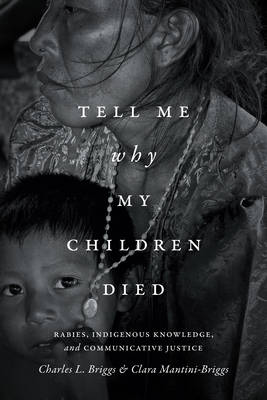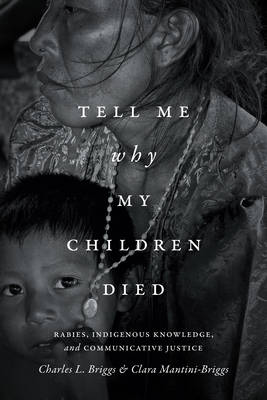
Bedankt voor het vertrouwen het afgelopen jaar! Om jou te bedanken bieden we GRATIS verzending (in België) aan op alles gedurende de hele maand januari.
- Afhalen na 1 uur in een winkel met voorraad
- In januari gratis thuislevering in België
- Ruim aanbod met 7 miljoen producten
Bedankt voor het vertrouwen het afgelopen jaar! Om jou te bedanken bieden we GRATIS verzending (in België) aan op alles gedurende de hele maand januari.
- Afhalen na 1 uur in een winkel met voorraad
- In januari gratis thuislevering in België
- Ruim aanbod met 7 miljoen producten
Zoeken
Tell Me Why My Children Died
Rabies, Indigenous Knowledge, and Communicative Justice
Charles L Briggs
€ 180,45
+ 360 punten
Uitvoering
Omschrijving
Tell Me Why My Children Died tells the gripping story of indigenous leaders' efforts to identify a strange disease that killed thirty-two children and six young adults in a Venezuelan rain forest between 2007 and 2008. In this pathbreaking book, Charles L. Briggs and Clara Mantini-Briggs relay the nightmarish and difficult experiences of doctors, patients, parents, local leaders, healers, and epidemiologists; detail how journalists first created a smoke screen, then projected the epidemic worldwide; discuss the Chávez government's hesitant and sometimes ambivalent reactions; and narrate the eventual diagnosis of bat-transmitted rabies. The book provides a new framework for analyzing how the uneven distribution of rights to produce and circulate knowledge about health are wedded at the hip with health inequities. By recounting residents' quest to learn why their children died and documenting their creative approaches to democratizing health, the authors open up new ways to address some of global health's most intractable problems.
Specificaties
Betrokkenen
- Auteur(s):
- Uitgeverij:
Inhoud
- Aantal bladzijden:
- 344
- Taal:
- Engels
- Reeks:
Eigenschappen
- Productcode (EAN):
- 9780822361053
- Verschijningsdatum:
- 23/05/2016
- Uitvoering:
- Hardcover
- Formaat:
- Genaaid
- Afmetingen:
- 155 mm x 234 mm
- Gewicht:
- 612 g

Alleen bij Standaard Boekhandel
+ 360 punten op je klantenkaart van Standaard Boekhandel
Beoordelingen
We publiceren alleen reviews die voldoen aan de voorwaarden voor reviews. Bekijk onze voorwaarden voor reviews.









